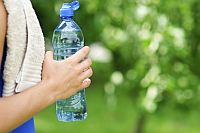NCD Watch
Exercise and Fluid Needs
24 Nov 2014 (Mon)
 Staying hydrated is essential for human survival, as an adult body constitutes 60% of water on average. In fact, every system in our body depends on water to maintain its function. For examples, water is essential for transportation of nutrients, maintenance of blood circulation and pressure, regulation and maintenance of body temperature (through sweating and respiration), etc.
Staying hydrated is essential for human survival, as an adult body constitutes 60% of water on average. In fact, every system in our body depends on water to maintain its function. For examples, water is essential for transportation of nutrients, maintenance of blood circulation and pressure, regulation and maintenance of body temperature (through sweating and respiration), etc.
Healthy adults in general are advised to drink 6 to 8 glasses (about 240 ml each) of water or fluids (such as milk or clear soup) every day. Yet, an earlier survey of about 2 100 community-dwelling people aged 18-64 in 2007 found that around one-third (32.3%) of the respondents reported consumption of less than 6 glasses of fluids on average a day.
Evaporation of sweat helps to cool the body down during exercise. Apart from water, sweat contains sodium, potassium and minerals. Drinking enough fluid is necessary to replace fluid lost in sweat during exercise. Failure to do so can lead to dehydration. On the other hand, overdrinking can lower the sodium level in the blood and cause hyponatraemia. Care should be taken before, during and after exercise in determining hydration status and replacement of fluids and electrolytes (such as sodium) to reduce the risk of dehydration and excessive electrolyte loss.
Fluid needs vary depending on the person, type, duration and intensity of exercises and the environmental conditions. Healthy adults can use the following guidelines as a reference and develop a customised fluid replacement plan according to personal needs.
Before exercise
– to optimise hydration status!
- Drink 480 - 600 ml of fluid slowly at least 4 hours before exercise.
- Water is usually the best choice.
During exercise
– to maintain fluid balance and prevent dehydration!
- Drink 90 - 240 ml of water every 15 to 20 minutes when exercising for less than 60 minutes.
- Drink 90 - 240 ml of sport drinks containing sodium every 15 to 20 minutes when exercising longer than 60 minutes or exercising in hot and humid environments, engaging in endurance exercise or high-intensity exercise (such as marathon running and competitive cycling or tennis), or wearing a lot of protective gears (such as in hockey).
- Do not drink more than 1 L of water per hour during exercise.
After exercise
– to fully replace both water and sodium loss in sweat!
- Compare the body weight before and after exercise to estimate any weight deficit (i.e. body weight in kg before exercise minus body weight in kg after exercise) that is likely from water loss.
- Fluids (and electrolytes) should be consumed over time rather than drunk in large boluses.
- Avoid alcohol as it can act as diuretics and increase urine output, thereby delaying full rehydration and physical recovery from exercise.
Young children, elders, and those with chronic medical illnesses (such as hypertension, heart disease, diabetes or renal disease) should seek family doctor's advice in deciding their exercise and fluid plans.






































